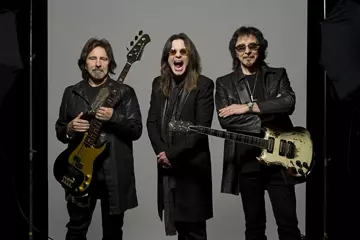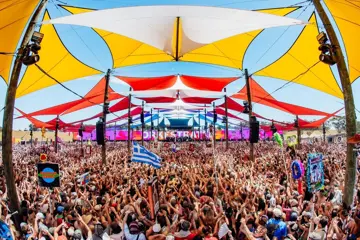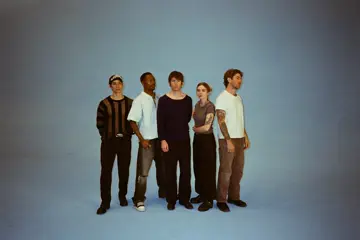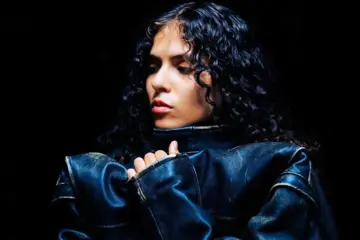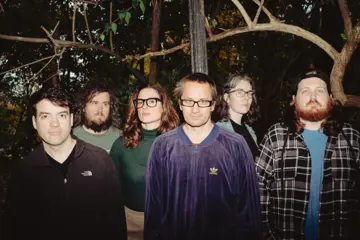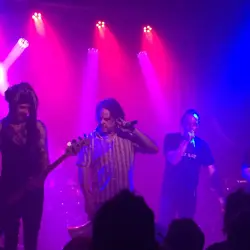 Pop Will Eat Itself
Pop Will Eat ItselfEven during their heyday in the late ‘80s and early ‘90s, UK alternative outfit Pop Will Eat Itself were something of a unique proposition. A rock band at heart, their innovative co-opting of dance culture tropes such as using beats and samples in a guitar context in many ways paved the way for industrial rock (Trent Reznor was a huge disciple, releasing their later albums in the States and taking them on tour with Nine Inch Nails).
They split in 1996 after five studio albums, reconvening sporadically for gigs over the next 15 years before officially reforming in 2011 in a new configuration (most notably without former vocalist Clint Mansell, who’s since forged a successful career as a soundtrack composer).The only surviving member of the original tenure, Graham Crabb – the group’s main songwriter, who originally began as drummer before leaving the beats to a machine to co-front with Mansell – believes that both versions of PWEI have their strengths and benefits.
“With the first line-up of the band we’d been friends together [beforehand], so it was like a big adventure really,” he recalls. “I remember Richard [March – bass] saying once that Pop Will Eat Itself was like a stag party that lasted for ten years, which is a pretty good summary. That’s just how it was. Maybe we weren’t as professional as we should have been, but we had a fantastic time. In version two of the band we have our moments too, but it was put together as a bunch of really fantastic musicians – people who’ve got a track record – so wherever we play now this band really impresses with its musicianship. It’s quite a hard-hitting band with a hard sound, so it’s a bit of a different proposition, but the two both work in their own ways.”
While PWEI straddled the divisions between the guitar and dance worlds, Crabb attests that this was indeed an organic happening.
“When I started writing for the band – and Clint too really – we had no schooling in songwriting so there were no particular dos or don’ts,” he continues. “Getting into the studio and getting access to more equipment we started to realise what you could do with this equipment and for us it was just a natural progression that we were going to use that stuff in line with the things we were listening to and the things we liked. As the hip hop explosion was happening and as the dance music explosion was happening it just became perfectly natural to get into the studio and use those pieces of equipment and get them for home, and that became our new sound. It wasn’t so much us trying to be pioneers as much as to do something that really excited ourselves. I guess from that point of view we were probably quite selfish, because we were just chasing an amalgamation of sounds that really excited us – that was our goal.”
And of course the music scene at the time was in a state of flux as it caught up with the endless possibilities afforded by new technologies, and the Poppies were caught up in that heady rush.
“In the early days we were into our punk rock or indie and alternative stuff – guitar music – and then the likes of Run DMC and the Beasties and Public Enemy came along, and that’s when I left the drum stool and we started using programmed beats,” Crabb tells. “In the UK at about the similar time we started having the rave scene and acid-house started taking off, and that was a big influence. I’d moved to London and there was a lot of warehouse parties going on and the acid-house scene was really taking off – those were the things that really shaped our sound.”
PWEI’s considerable appeal was also strengthened by sardonic and often biting lyrics, which could be as humorous as they were intelligent.
“Again it was just an organic thing – we used to all hang out a lot together and shoot the breeze and just talk shit, and I suppose all of those things came up in song lyrics,” Crabb smiles. “When we started following the rap format it gives you the scope to put a lot more into your lyrics, if only because you’ve suddenly got to write four or five times the amount of words than you would in an average guitar song, so breaking away from that simple verse-chorus-verse structure gives you a lot more scope. From our punk roots you do want to say something that’s got some kind of social conscience, or some kind of rebellion stance where things are pissing you off, so I suppose it was always in our hearts that we wanted to say something meaningful compared to some of the crap that people spout.”






